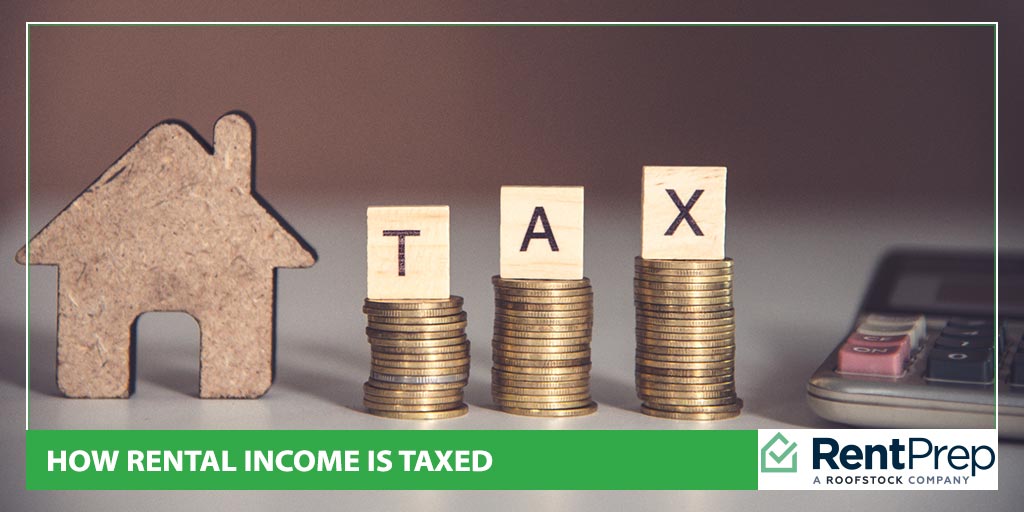
Updated February 2024
Navigating the complexities of reporting rental income and claiming deductions can be overwhelming. But you’ve come to the right place. Our comprehensive guide is crafted to empower landlords like you with essential insights and help unlock the full potential of your rental income, a significant part of your taxable earnings.
Accurate record-keeping and annual reporting to the IRS are key to helping you be compliant and avoid potential fines or legal issues. Embrace the paperwork involved in property rental as an opportunity to maximize your returns.
Here, we’ll delve into what qualifies as rental income for tax purposes, highlight deductible expenses related to property rental, and guide you on the appropriate IRS forms for declaring your rental income.
We’ll help you stay informed to ensure a smooth and compliant tax journey.
Table Of Contents: Tax On Rental Income
While rental income tax is not overly complicated, you do need to double-check that you have dotted all your I’s and crossed your T’s.
- How Is Rental Property Income Taxed?
- What Rental Income Is Taxed?
- What Year Should Rental Income Be Reported?
- What Rental Property Tax Deductions Can Landlords Take?
- Tax Rate: Passive Or Active?
- How Much Tax Do I Pay On Rental Income?
- How To Report Tax On Rental Income
- FAQs: Tax On Rental Income
- What happens if you don’t report rental income?
- Is rental income taxed differently than earned income?
- Is renting a room taxable income?
- How much tax do you pay on rental income?
- How do I report rental income?
- What is advance rent, and how is it taxed?
- Is a landlord considered self-employed?
- Do foreigners pay tax on rental income in the United States?
- Tackle Your Rental Income Taxes Head-On
How Is Rental Property Income Taxed?
 First and foremost, to dispel any lingering doubts, we’ll answer the frequently asked question: Is rental income taxed in the United States?
First and foremost, to dispel any lingering doubts, we’ll answer the frequently asked question: Is rental income taxed in the United States?
Yes, landlords are responsible for paying taxes on all income received from property rental. In most, but not all, cases, this type of income is treated as passive and, therefore, taxed at the IRS’s marginal rate.
IRS guidelines on how rental income is taxed are available here.
What Rental Income Is Taxed?
Your overall rental income comes from a variety of sources. But are they all taxable?
Again, yes. As a landlord, all income you receive through your rental property is considered taxable. This includes tenants’ rent payments, security deposits, leasing fees, and other cash flowing through the property. A lump sum paid to cancel a lease is also considered income.
Importantly, rental income is taxable in the year in which you receive the funds, which may not be the same year to which the income applies.
For example, if a tenant moves in and pays their first and last month’s rent upfront, the total payment you receive is taxable in the current tax year, even if the last month’s rent won’t actually apply until a future year.
Whether a security deposit should be included as rental income depends on the particular situation. If the rental agreement stipulates that, assuming there are no deductions for damages, the full security deposit will be used to pay the last month’s rent, then it is taxable as income.
However, if the rental agreement states that the security deposit will be returned to the tenant at the end of the lease minus any expenses and that the tenant will pay the last month’s rent in the usual manner, then the security deposit does not count as rental income. In this case, the security deposit should be held separately and not treated as income.
If you end up keeping any portion of a security deposit to cover expenses such as damages, you’ll need to add the amount you retain to your taxable income for the year in which you keep the money.
One of the few exceptions to taxable rent income can be income from short-term rentals. This type of income, such as when renting out your property through a vacation rental service, can sometimes be non-taxable. Specifically, if the property is rented for 14 days or fewer in a year, any income you make through those rentals is non-taxable.
Spending at least 10% of the total occupied days living in the property yourself does not make the rental income non-taxable, but it can impact how your short-term rentals are taxed.
What Year Should Rental Income Be Reported?
As mentioned, rental income must be reported on your tax return for the year in which it was received, regardless of when it covers the rent due.
For example, consider when a tenant pays you in December for their January rent. You receive the money in December, so it should be included on that year’s tax return, not the following year. Even if you do not deposit the funds immediately, you must consider it received once it’s given to you.
What Rental Property Tax Deductions Can Landlords Take?
 It goes without saying that while you’re making money from renting out your property, it’s also costing you to maintain it and manage its rental. You may also be making mortgage interest payments on the property. These types of expenses and others can be taken as deductions to your taxable income to offset your costs.
It goes without saying that while you’re making money from renting out your property, it’s also costing you to maintain it and manage its rental. You may also be making mortgage interest payments on the property. These types of expenses and others can be taken as deductions to your taxable income to offset your costs.
Many different elements count as tax deductible. You can see our complete guide to tax deductions for landlords here, but the most common deductions include the following:
- Advertising costs
- Upkeep, maintenance, and cleaning
- Commissions paid to agents
- Property depreciation
- Mortgage interest
- Depreciation of any capitalized improvements
- Property fees, such as condo fees
- Insurance premiums
- Local property taxes
- Equipment rental
- Repairs
- Travel expenses
- Pest control
- Professional service fees
All deductible expenses must be properly documented so you can prove that the write-off is reasonable and necessary. To do this if required, be sure to hang onto bank statements and receipts.
Let’s look closer at two of the potential deductions on the list: depreciation and mortgage interest.
What Is Depreciation?
Depreciation is an accounting principle that allows you to deduct the cost of a rental property over a set period. The IRS uses the straight-line method for residential rental properties, depreciating the property evenly over 27.5 years. You can deduct depreciation from your annual taxable income as long as you own the property and it generates income.
Depreciation accounts for wear and tear and can be applied both to the property and to any improvements you make, such as installing a new kitchen or renovating a bathroom. Depreciation is calculated starting from either the date you place the property “in service” or from when you make the improvement.
You can recover depreciation losses using Form 4562. This form can also be used to reclaim direct expenses associated with any improvements you make to the property.
What Are Mortgage Interest Deductions?
While your mortgage principal payments are not tax deductible, both your mortgage interest and any expenses you may have incurred to obtain the mortgage are deductible. However, there are limits on what you can claim.
If you acquired a property on or before December 15, 2017, the maximum home acquisition debt you can carry on that property and your primary residence combined is $1,000,000. If the property was acquired after December 15, 2017, the home acquisition debt limit is reduced to $750,000.
Please note that these limits apply to the mortgage interest deduction on your federal income tax return. Always consult with a tax professional to understand how these rules apply to your specific situation.
For more information on how to report rental tax, including questions about rental income and deductions, check out this exclusive interview with tax expert Mark Kohler:
Tax Rate: Passive Or Active?
The applicable tax rate on your rental income will depend on whether your rental business is a passive or active entity in the eyes of a tax collecting agency.
Generally speaking, tax law classifies rental income as passive unless the taxpaying landlord is a qualified real estate professional or their rental business is qualified as an active business under the tax code.
If your rental income is considered passive, losses from your activity can only be deducted from declared passive income, capping how much you can claim. Of course, there are exceptions.
How Much Tax Do I Pay On Rental Income?
The tax you must pay on your rental income is mainly determined by which tax bracket you fall into.
If your rental income is considered passive, then you will pay at the marginal rate, which has been defined by the IRS as follows for 2024:
- 35% for incomes over $243,725 ($487,450 for married couples filing jointly)
- 32% for incomes over $191,950 ($383,900 for married couples filing jointly)
- 24% for incomes over $100,525 ($201,050 for married couples filing jointly)
- 22% for incomes over $47,150 ($94,300 for married couples filing jointly)
- 12% for incomes over $11,600 ($23,200 for married couples filing jointly)
- 10% for incomes below $11,600 ($23,200 for married couples filing jointly)
If your income is considered active, you’ll pay at the higher effective income tax rate along with your other earned income.
How To Report Tax On Rental Income
Now that you know more about how rental income tax works, let’s get into how to gather your information and report it.
Preparations
Before tax season even begins, ensure you regularly update your records with all of the rental income you receive. If your files are always up to date, sitting down to prepare your taxes when tax season rolls around won’t be as overwhelming.
But if you haven’t done this for the upcoming tax season, don’t panic. You can recall this information through your bank accounts, receipts, and other documentation. Dedicate a few hours to gathering and organizing this information so you can prepare your taxes with confidence.
The 1040 Form
The first form you’ll need to complete and submit is Form 1040. The 1040 is the basic personal income tax form that everyone who files federal taxes needs to fill out. To complete this form in its entirety, you’ll need to be prepared with personal information such as your:
- SSN
- Dependants and related information
- Earnings information
Depending on your situation, you may be responsible for providing additional information or forms unrelated to your rental business. This cannot be determined based on being a landlord alone but depends on other factors, too.
Schedule E
The next form you’ll need in order to file your income taxes is Schedule E. Also known as the Supplemental Income and Loss form, Schedule E is used to report income or loss from:
- Reported income or loss from rentals
- Royalties
- Partnerships and S corporations
- Estates and trusts
Landlords are required to use Schedule E to report their rental income, expenses, and the depreciation of their rental properties. This form will help you accurately report your rental earnings and ensure correct filing.
If you own more than three rental properties, you’ll need to fill out a separate Schedule E for each group of up to three properties. For landlords with four or more properties, this can be done by:
- Completing one Schedule E form for the first three properties
- Using additional Schedule E forms as needed to list the remaining properties
When filling out the Schedule E forms, only the totals on line 1 of each form should be filled in. These totals should represent the combined totals from all your Schedule E forms.
If you’re using tax software to prepare your return, the software will likely auto-fill parts of your return as you enter your information. This feature, often referred to as “Auto-fill my return,” automatically transfers your data to the appropriate sections in your return. However, it’s important to understand the process behind this auto-fill feature to better comprehend what’s being included in your tax return documentation.
As always, remember that filing your income taxes is a process that varies depending on your circumstances. These instructions are a general guide only and may not cover every individual’s situation, so always consult with a tax professional to understand how these rules apply to your specific situation and to ensure you aren’t missing anything, including applicable deductions.
FAQs: Tax On Rental Income
Below are answers to some of the most frequently asked questions by landlords about rental income and tax.
What happens if you don’t report rental income?
Failure to report rental income is never a good idea. Even if you ultimately face a loss from rental property, you must report your income and expenses. If you do not, you could face serious consequences. At the very least, you’ll have to pay fines. At most, you could face prison time.
Is rental income taxed differently than earned income?
The tax rate applied to your earned income is likely higher than your rental income tax rate, but the situation varies. Your earned income is taxed at your marginal tax rate, while rental income is taxed based on your Schedule E incomes and losses.
Is renting a room taxable income?
Yes, income generated from renting a room in your home is taxable. That means it must be reported on your tax return. That being said, the tax deductions and write-offs you may be eligible for could offset any tax burden.
How much tax do you pay on rental income?
How much tax you pay on your rental income depends on whether it is active or passive income and which tax bracket you fall into. In most cases, rental income is considered passive, meaning it’s taxed at the marginal tax rate. This starts at 10% and goes up to 35%, as listed in detail above.
How do I report rental income?
Rental income should be reported to the IRS annually as part of your overall tax return. Use Form 1040 and Schedule E to submit details of your rental income.
What is advance rent, and how is it taxed?
Advance rent is paid in advance of the time period it covers, for example, when a tenant pays three months’ rent in advance or the first and last months’ rent as part of their initial payment. This income is taxed in the year you receive it rather than the year it applies to.
Is a landlord considered self-employed?
Rental income is not considered to be self-employment income for federal tax purposes. Rental income is considered, in most cases, to be a passive income. This means it can only be used to offset other passive income and losses on Schedule E.
Self-employment income, on the other hand, is calculated and taxed based on Schedule C.
Do foreigners pay tax on rental income in the United States?
Yes, if you are a non-U.S. citizen who owns property in the United States and generates income through rental, you are required to pay tax. This income is typically subject to a flat 30% tax rate.
However, foreign investors can choose to report rental income net of expenses, which may then be subject to tax at the regular progressive income tax rates.
Tackle Your Rental Income Taxes Head-On
All income from renting a property is taxable and should be declared to the IRS each year along with your other types of income. Doing this is not complicated if you keep detailed records and know your tax rate. You can also optimize your tax liability by including all legal deductibles on your return.
Of course, every situation is different, and there are exceptions to every rule. So, be sure you research any specific rules that might apply in your state or to your particular situation before you file your return.
For more advice on managing your rental business, from tenant selection to taxes, sign up to receive more free landlord resources from RentPrep.
Note: RentPrep does not provide tax, legal or accounting advice. This material has been prepared for informational purposes only and is not intended to provide, and should not be relied on for, tax, legal, or accounting advice. You should consult your own tax, legal, or accounting advisors.

